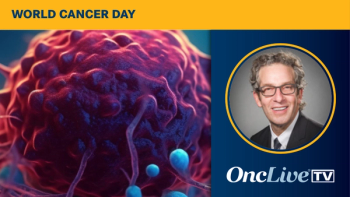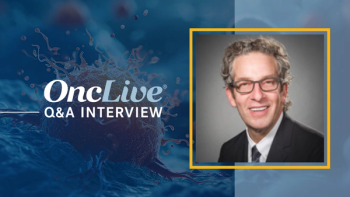
Nivolumab/Ipilimumab Plus Chemo Approved in Europe for Frontline Metastatic NSCLC
The European Commission has approved the combination of nivolumab plus ipilimumab with 2 cycles of platinum-based chemotherapy for the up-front treatment of adult patients with metastatic non–small cell lung cancer without a sensitizing EGFR mutation or an ALK translocation.
The European Commission has approved the combination of nivolumab (Opdivo) plus ipilimumab (Yervoy) with 2 cycles of platinum-based chemotherapy for the up-front treatment of adult patients with metastatic non–small cell lung cancer without a sensitizing EGFR mutation or an ALK translocation.1
This is the first dual immunotherapy–based treatment regimen to receive regulatory approval for use in this patient population who are living in the European Union (EU), according to according to Bristol Myers Squibb.
The regulatory decision was based on data from the pivotal phase 3
“In the CheckMate-9LA trial, combining nivolumab and ipilimumab with 2 cycles of chemotherapy resulted in clinically meaningful survival benefits, which were consistent across patients with NSCLC, regardless of PD-L1 expression levels or tumor histologies,” Martin Reck, MD, PhD, study investigator, of the Lung Clinic Grosshansdorf, German Center of Lung Research, stated in a press release. “Following today’s approval, clinicians in the EU will be able to offer patients a new option that may help achieve early disease control and improve survival.”
In the randomized, open-label, multicenter phase 3 trial, investigators examined nivolumab in combination with ipilimumab with 2 cycles of platinum-doublet chemotherapy compared with platinum-doublet chemotherapy alone as a first-line treatment approach in patients with metastatic or recurrent NSCLC.
A total of 361 patients were given the immunotherapy/chemotherapy regimen until either disease progression, unacceptable toxicity, or for up to 2 years. Patients were randomized 1:1; 361 patients received nivolumab at a dose of 360 mg plus ipilimumab at a dose of 1 mg/kg with 2 cycles of platinum-doublet chemotherapy, while 358 patients were given 4 cycles of chemotherapy alone, based on tumor histology. Patients in the control arm could receive optional maintenance pemetrexed if they had nonsquamous disease until disease progression or intolerable toxicity.
Treatment-naïve patients were allowed to enroll if they had histologically confirmed stage IV/recurrent NSCLC and an ECOG performance status of 0-1 without any sensitizing EGFR or ALK aberrations. Stratification was based on PD-L1 expression, sex, and histology.
The primary end point of the trial was OS. Secondary end points comprised progression-free survival (PFS), overall response rate (ORR), and efficacy by PD-L1 subgroups. Other end points examined were safety and tolerability.
Moreover, in a follow-up analysis of 12.7 months, a numeric improvement in HR was observed in the investigative arm versus the control arm (HR, 0.66; 95% CI, 0.55-0.80). The median OS with nivolumab/ipilimumab plus limited chemotherapy was 15.6 months versus 10.9 months with chemotherapy alone.
At 1 year, 63% of the patients who were treated with nivolumab/ipilimumab plus chemotherapy were alive versus 47% of those who just received chemotherapy.
Additional results showed that the chemoimmunotherapy approach elicited an ORR of 38% (95% CI, 33-43) compared with 25% (95% CI, 21-30) with chemotherapy alone, per blinded independent central review (BICR).
Regarding safety, 57% of patients on the trial reported serious adverse effects (AEs). Among those who received the investigational regimen, 24% experienced toxicities that resulted in treatment discontinuation; 56% of patients had a least 1 treatment withheld because of toxicity.
The most commonly reported serious toxicities were pneumonia, diarrhea, febrile neutropenia, anemia, acute kidney injury, musculoskeletal pain, dyspnea, pneumonitis, and respiratory failure. Seven patients experienced toxicities that proved to be fatal; these effects included hepatic toxicity, acute renal failure, sepsis, pneumonitis, diarrhea with hypokalemia, and massive hemoptysis in the setting of thrombocytopenia.
Fatigue (49%), musculoskeletal pain (39%), nausea (32%), diarrhea (31%), rash (30%), decreased appetite (28%), constipation (21%), and pruritis (21%) were among the most frequently experienced AEs.
During the
“The European Commission’s approval of [nivolumab] plus [ipilimumab] with 2 cycles of chemotherapy is an important milestone for patients with metastatic NSCLC who face a difficult prognosis despite recent advances,” Abderrahim Oukessou, MD, vice president and thoracic cancers development lead at Bristol Myers Squibb, added in the release. “This innovative regimen is built on the only approved dual immunotherapy foundation…We look forward to collaborating with a broad range of European stakeholders to bring this unique combination of 2 potentially synergistic immunotherapies with chemotherapy to eligible patients with lung cancer.”
The new approval marks the third indication for a nivolumab/ipilimumab–based regimen in the EU. Previously, the immunotherapy combination has indications in metastatic melanoma and advanced renal cell carcinoma. In addition to the EU approval, nivolumab/ipilimumab plus 2 cycles of chemotherapy has been approved in 11 countries for up-front use in patients with metastatic NSCLC.
In May 2020, the regimen was
References
1. Bristol Myers Squibb receives European Commission approval for Opdivo (nivolumab) plus Yervoy (ipilimumab) with two cycles of chemotherapy for first-line treatment of metastatic non-small cell lung cancer. News release. November 6, 2020. Accessed November 6, 2020.
2. Reck M, Ciuleanu TE, Cobo Dols M, et al. Nivolumab (NIVO) + ipilimumab (IPI) + 2 cycles of platinum-doublet chemotherapy (chemo) vs 4 cycles chemo as first-line (1L) treatment (tx) for stage IV/recurrent non-small cell lung cancer (NSCLC): CheckMate 9LA. J Clin Oncol. 2020;38(suppl 15):9501. doi:10.1200/JCO.2020.38.15_suppl.9501.
3. Reck M, Ciuleanu T-E, Cobo M, et al. First-line nivolumab (NIVO) + ipilimumab (IPI) combined with 2 cycles of platinum-based chemotherapy (chemo) vs 4 cycles of chemo in advanced non-small cell lung cancer (NSCLC): patient-reported outcomes (PROs) from CheckMate 9LA. 2020;31(suppl 4):S1187-S1188. doi:10.1016/j.annonc.2020.08.2292




































